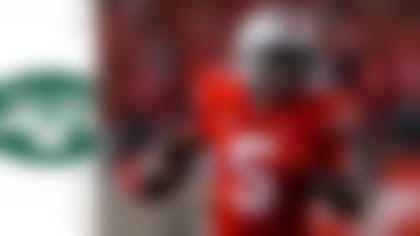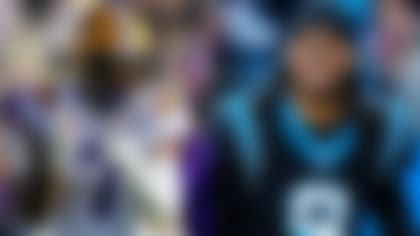In this four-part series, I'm using my context-based data models to evaluate some of the top draft prospects at four key positions -- pass rusher, quarterback, cornerback and wide receiver -- while providing a pro comparison and ideal team fit for each.
The goal for the comps: showing some of the strengths, weaknesses and unknown résumé aspects for each prospect, while offering a perspective to approximate how team analytics departments might view the player's potential NFL impact.
The goal for the team fits: maximizing the draftee's 2022 win share, factoring in what we know about each team's personnel, coaches and strategy right now. And of course, as much as possible, I'm aiming to present realistic matches, ones that could actually come to fruition on draft day.
Today, we continue the series with the quarterbacks ...

PRO COMPARISON: Derek Carr, Las Vegas Raiders
This might be the first time I can remember when the blend of comps didn't yield a single player with more than an 18 percent top match for any of the top five prospects in a position group. This suggests that positional scarcity at quarterback is driving where these signal-callers will be drafted even more than in a normal year. The lead comp typically falls in the 20-to-27 percent match range for the top five players at a position. While my models always include multiple player comps, there are usually only one or two that stand out as most similar. Here, Carr edged out four slightly lower percentage matches, including Andy Dalton, a taller Chase Daniel and a later-career Jay Cutler (when his deep ball didn't have consistent top-end velocity). Computer Vision shows that Pickett was best in the FBS last season against pro-style defenses (defined as those with hybrid fronts, disguised man vs. zone backs and/or non-base defensive formations). I converted his college performance to the NFL passer rating formula, which resulted in a 112.2 mark versus such defenses. Pro Football Focus adds that Pickett led the NFL with 25 touchdown passes against the blitz in 2021, which was four more than his first four college seasons combined (21). He was also one of just three QBs in the FBS to earn at least 10 passing TDs (14, to be exact) when under pressure. All three points support a smoother transition to the NFL from a résumé standpoint.
TEAM FIT: Carolina Panthers
Interestingly, Sam Darnold does come up in the comp pool. I spent a lot of time evaluating Pickett's arm talent on deep passes, and of the metrics I measure -- accuracy, speed the ball travels en route to the pass catcher (including how consistently by route), how consistently the ball arrives in the direction the receiver is traveling, etc. -- he falls within the 65-to-75 percentiles in the historical sample in all of them, which is squarely above average. Pickett is my top QB in this class, and making this Pittsburgh Panther into a Carolina Panther creates the most wins in 2021, even though Carolina is not the most QB-needy team.

PRO COMPARISON: Jalen Hurts, Philadelphia Eagles
No QB in this class made it into Round 1 of my mock draft 2.0, which values win shares added only for the 2022 season, in large part because the group has a wide range of outcomes for each player. Willis' data reaches the highest ceiling, but it could take many different paths. Other comparisons that pop up here include a shorter Colin Kaepernick, Tyrod Taylor and even some Steve McNair on the elusiveness front. There are also many lesser-known players who come up equally as often in the comparisons here. Willis has top-11 overall change-of-direction speed with the ball in his hands among QBs in my 20-season Computer Vision sample. This helped lead to his 91.3 passer rating throwing on scrambles (best in the FBS) -- PFF graded him at 94.5 on scramble drills, also best in FBS among QBs with at least 20 such dropbacks. And his 90 forced missed tackles as a runner was also the most in a season since PFF tracking began in 2014.
TEAM FIT: New York Giants
Yes, this does include Daniel Jones starting in 2021. I have given these QBs all a three-year horizon for success. I love this fit for a few reasons, but the main one is Brian Daboll's ability to create schemes that have made the most of his quarterbacks' respective skill sets. I realize this won't be satisfying to some, but the opportunity to get the QB position right for this new regime is priceless. Bringing in the highest-upside guy with the kind of physical attributes Daboll has successfully developed in the past with one of the Giants' higher picks (my recommendation would be to trade down in Round 1, if possible) creates the best opportunity for New York in the long term. If draft position weren't considered at all in this exercise -- and I look for the top-end fit opportunity, meaning the fit that drives the most wins if Willis takes the highest production development path -- the Miami Dolphins become the best fit.

PRO COMPARISON: Jake Plummer, retired
I have created a 20-season sample, which means that Plummer's first four seasons in the NFL weren't originally included. However, the match percentages popped, so I added Plummer's full career to this and BOOM(!): It's the highest fit for this QB class. PFF shows that Corral used play-action more than any other QB in 2021 (60.4 percent) and had the most yards on such passes (2,207), while being one of just two QBs to throw for more than 2,000 yards off play-action last season. Having the foundation of the offense in play-action allowed him to strategically use deep passes, and he was the second-most accurate on deep passes by FBS QBs with at least 75 attempts in the past two seasons (48.0 percent).
TEAM FIT: Tennessee Titans
Corral is my second-most pro-ready QB prospect, but my models don't love him starting in Year 1. This player-team pairing doesn't throw shade Ryan Tannehill's way, but rather respects the system of leveraging Corral's skill set (play-action) the most. It also takes a swing at bringing in a potential QB for the future, before it's absolutely necessary down the line. Of the current QB-needy teams, Seattle creates the highest three-season win share.

PRO COMPARISON: Marcus Mariota, Atlanta Falcons OR Ryan Tannehill, Tennessee Titans
To be clear, this is not suggesting that Ridder should or will be drafted as high as either of his comps were. However, Pro Football Focus shows he had the second-most big-time throws in the FBS this season with 82 and had the lowest turnover-worthy plays in a season since 2020 with 0.0. He was the only QB with 50-plus deep pass attempts and zero such plays. PFF shows that Ridder had 14 touchdowns and zero interceptions on deep passes in 2021, which was the second-most in a season since college tracking began in 2014. Computer Vision shows that Ridder's deep passing accuracy (how often the ball came within 3 feet of intended targets) improved the most among draft-eligible QBs over the course of the past two seasons.
TEAM FIT: Atlanta Falcons
So you have the opportunity to learn from one player comp (Mariota) and a coach (Arthur Smith) who previously worked with both of Ridder's comps. Please let this happen -- we need to see it unfold.

PRO COMPARISON: A modernized Drew Brees
Howell compared himself to Brees at the NFL Scouting Combine, so I looked into it and there are a lot of notes that fit here -- namely processing, a Computer Vision metric that measures how much a QB's head moves from the time he lines up for the play until the ball's release. (Note: I've had NFL coaches help me train this model for the right amount of head movement, which depends on the play.) Computer Vision shows that Howell was the best in the FBS at decision-making on third down (as measured by earning a first down/TD or avoiding taking negative yards), which has been an extremely predictive metric in the 20-year sample. In fact, Howell is my model's second-favorite QB in terms of projected success. PFF shows that Howell had 82 big-time throws in his college career (2019 through 2021), which was 16 more than any other FBS quarterback and 28 more than any other Power Five QB. His pro comp is "a modernized Drew Brees" because they're similar in many ways, but Howell offers more as a straight runner than the future Hall of Famer did. Howell logged 65 forced missed tackles in 2021, the most by a Power Five quarterback since PFF started tracking college ball in 2014.
TEAM FIT: Indianapolis Colts
PFF shows that Howell used play-action the most in the ACC last season (48.9 percent). He also had the fifth-highest big-time throw percentage (8.9) in the entire FBS over the past five seasons. The opportunity to learn behind Matt Ryan and operate behind that line -- with Jonathan Taylor's presence in the backfield making the play-action game pop -- creates the optimal upside. The Saints also make a lot of sense and have the blend of success attributes and draft capital to take this swing.
Follow Cynthia Frelund on Twitter.




